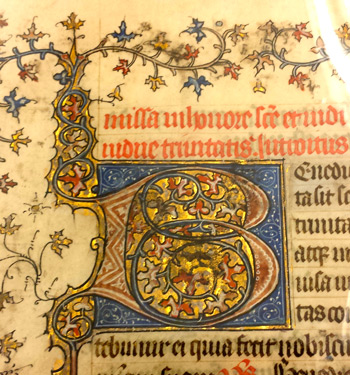Resources
Special Collections
The Special Collections and Rare Books Department at MU’s Ellis Library holds over 90,000 rare volumes, ranging from Sumerian cuneiform tablets from the third millennium B.C.E. to Charlotte Bronte’s hand-written juvenilia. The department supports research in Medieval and Renaissance studies with its collection of manuscripts and early printed books, which includes 15 manuscript codices from Western and Central Europe, primarily late medieval; 26 incunabula, mainly Italian and German; as well as two important collections of manuscript leaves.

A particularly outstanding example of the latter is the Fragmenta Manuscripta collection, a group of over 200 leaves from manuscripts dating from the 8th to the 16th centuries that was assembled in the late 17th century by the antiquarian John Bagby. These leaves represent important works by Bede, Chaucer, and Lydgate, among others. The fragment of Chaucer’s Boece is one of only 11 surviving witnesses of this important text, and one of only 16 Chaucer manuscripts in North America. Images and catalog records for Fragmenta Manuscripta are available online at http://www.scriptorium.columbia.edu.
Among the complete manuscript codices housed in the department are works of Priscian, St. Ambrose, and Raymond of Penafort. We own a complete copy of Summa de poenitentiae et matrimonio (Compendium of Penance and Matrimony), St. Raymond of Penafort’s authoritative commentary on canon law. Our copy was produced in Southern France in the fourteenth century, and has magnificent red and blue initials with intricate penwork flourishes. Catalog descriptions of our entire collection of manuscripts are available at http://mulibraries.missouri.edu/specialcollections/manuscript.
Our growing collection of incunabula and early printed works includes works by Boccaccio, Albertus Magnus, Trithemius, Savonarola, and Martin Luther. Undoubtedly one of the most spectacular specimens of this collection is the Liber chronicarum, or Nuremberg Chronicle, which offers no less than a history of the world, illustrated with almost a hundred woodcuts that were created at the studio of Michael Wolgemut, the studio that employed the young Albrecht Dürer. Catalog records for our incunabula are available at http://mulibraries.missouri.edu/specialcollections/incunabula.
Other strengths include multiple early editions of Ovid’s Metamorphoses including one manuscript copy from the 16th century, 16 from the 16th century and five from the 17th; different editions of Holbein’s Dance of Death woodcuts, etchings and engravings; and the Howey Collection, which comprises 20,000 English pamphlets from the 17th- to the 19th- centuries that deal with contemporary political and religious issues.

